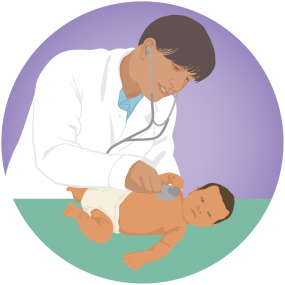Your Infant has Dengue
What is Dengue?
Dengue is an illness spread through the bite of an infected mosquito. If you live in or are traveling to an area with risk of dengue, protect your infant from mosquito bites.
Symptoms: Your Infant Can’t Tell You He or She is Sick
Symptoms of dengue in an infant may be difficult to recognize and are similar to other common childhood infections. See a healthcare provider immediately if your infant develops a fever with any of the following symptoms:
- Fever or a low temperature (less than 36°C or 96.8°F) with any of the following:
- Sleepiness, lack of energy, or irritability
- Rash
- Unusual bleeding (gums, nose, bruising)
- Vomiting (at least 3 times in 24 hours)
Symptoms of dengue can quickly become severe, requiring immediate medical attention or hospitalization.

Caring for Your Sick Infant at Home
- Control the fever: Give acetaminophen (also known as paracetamol outside the United States). Always follow label instructions. Give cool water sponge baths.
- Give plenty of fluids such as water or drinks with added electrolytes. Dehydration occurs when a person loses too much body fluid from fever, vomiting, or not drinking enough fluids.
- Watch for signs of dehydration and seek care immediately if your infant develops signs of dehydration.
Signs of mild to moderate dehydration
Signs of mild to moderate dehydration
Signs of severe dehydration
Signs of severe dehydration
Urinates less frequently (less than 6 wet diapers per day)
Urinates less frequently (less than 6 wet diapers per day)
Sleepiness, lack of energy, very fussy
Sleepiness, lack of energy, very fussy
Dry mouth, tongue, lips
Dry mouth, tongue, lips
Sunken eyes
Sunken eyes
Few or no tears when crying
Few or no tears when crying
Cool, discolored hands or feet
Cool, discolored hands or feet
Sunken soft spot of the head
Sunken soft spot of the head
Urinates 1-2 times per day
Urinates 1-2 times per day
What to do: Contact your child’s pediatrician immediately.
What to do: Contact your child’s pediatrician immediately.
What to do: Go to an urgent care clinic or the emergency room.
What to do: Go to an urgent care clinic or the emergency room.